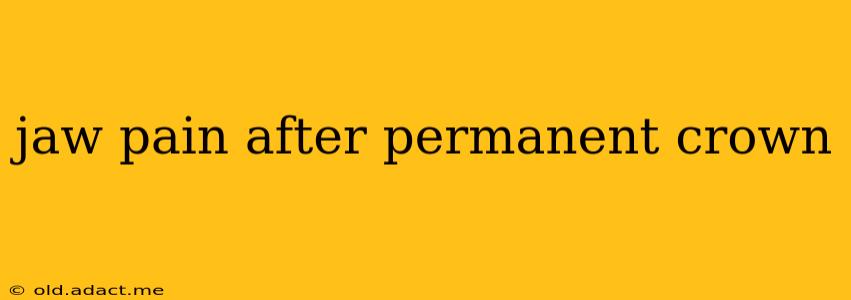Experiencing jaw pain after getting a permanent crown is unfortunately not uncommon. While a crown is designed to restore a damaged tooth, the process itself, or the crown's presence, can sometimes lead to discomfort in the jaw. This post will delve into the potential causes of this pain, explore effective treatment options, and offer preventative measures to help you avoid this issue.
Why Does My Jaw Hurt After Getting a Crown?
Several factors can contribute to jaw pain following a permanent crown placement. Understanding these causes is crucial for effective management and prevention.
1. TMJ (Temporomandibular Joint) Disorder Exacerbation:
Many people unknowingly suffer from mild TMJ disorders. The process of fitting a crown, including the potential need for adjustments or temporary crowns, can stress the jaw joint and exacerbate existing TMJ problems, leading to pain and discomfort. This is particularly true if the bite is altered, even slightly, by the new crown.
2. Inflammation and Irritation:
The procedure itself can cause inflammation and irritation in the surrounding tissues. This inflammation can radiate to the jaw, causing pain and tenderness. This usually subsides within a few days, but persistent pain warrants a check-up with your dentist.
3. Occlusal Problems (Bite Issues):
An improperly fitted crown can affect your bite, leading to uneven pressure on the jaw joint. This malocclusion can cause significant jaw pain, headaches, and even earaches. Your dentist needs to ensure the crown's height and position are perfectly aligned with your other teeth to prevent bite issues.
4. Sinus Issues:
Upper molars are close to the sinuses. If the crown procedure involves significant work on an upper molar, or if there is inflammation or infection, it can sometimes impact the sinuses, leading to referred pain in the jaw.
5. Tooth Sensitivity:
While less directly related to jaw pain, increased tooth sensitivity after crown placement can sometimes lead to clenching or grinding, indirectly causing jaw pain.
What Should I Do if I Have Jaw Pain After a Crown?
If you're experiencing jaw pain after a permanent crown, don't ignore it. Here's what you should do:
- Contact your dentist immediately: They can assess the situation, determine the cause, and provide appropriate treatment. Don't attempt self-treatment.
- Over-the-counter pain relievers: Ibuprofen or acetaminophen can help manage mild pain and inflammation while you wait for your appointment.
- Apply a warm or cold compress: Experiment with both to see which offers more relief. Warm compresses can help relax tense muscles, while cold compresses can reduce inflammation.
- Avoid chewing on the affected side: Give your jaw a rest to promote healing. Eat soft foods.
- Gentle jaw exercises: Your dentist might recommend gentle stretching exercises to improve jaw mobility and reduce tension. Avoid strenuous exercises until your pain subsides.
How Can I Prevent Jaw Pain After Crown Placement?
Prevention is key. Here are some steps you can take to minimize the risk of jaw pain following a crown:
- Choose an experienced dentist: An experienced dentist will be more likely to achieve a precise fit and minimize potential complications.
- Communicate clearly with your dentist: Let them know about any pre-existing jaw or TMJ issues.
- Follow post-operative instructions carefully: This includes avoiding hard or chewy foods and maintaining good oral hygiene.
- Manage stress: Stress can exacerbate TMJ disorders, so finding healthy ways to manage stress can help.
Is Jaw Pain After a Crown Normal?
Some minor discomfort or tenderness is normal in the immediate aftermath of crown placement. However, persistent, severe, or worsening jaw pain is not. Always consult your dentist if your pain is concerning or doesn't improve.
By understanding the causes, seeking prompt professional help, and taking preventive measures, you can significantly reduce the risk of experiencing jaw pain after a permanent crown and ensure a smoother recovery. Remember, open communication with your dentist is crucial for optimal oral health.
